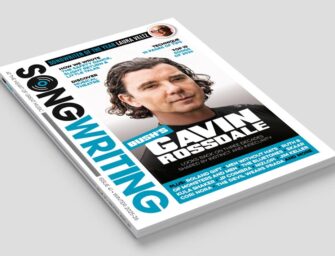
Michelle Willis: “Bad ideas are a necessary stepping stone to good ideas.” Photo: David Goddard
The Canadian songwriter and David Crosby band member has put together a septet of tips that will improve your process
Hailing from Toronto, Canada, Michelle Willis is a songwriter and keyboard player currently living in Brooklyn. Perhaps best known for her works with David Crosby & Sky Trails, David Crosby & Lighthouse, and the Becca Stevens Band, Willis is also a solo artist and has recently released her superb second album, Just One Voice. With guest appearances from bandmates Crosby and Stevens, as well as Michael McDonald, Grégoire Maret, and Taylor Ashton, the album is a rich and immersive experience that manages to sound entirely current while harking back to the very best singer-songwriter traditions.
Here, Willis shares some great advice that will help all songwriters improve their craft…
1. CHECK YOUR TENSES
Something simple that often takes away from the flow or feeling of a song can be as simple as aligning the tense of the lyric. Sure, some songs exist in multiple states of thought, but in general, keeping stanzas or sections of a song in the same tense can go a long way in connecting the listener more deeply to the story. It can also help you to navigate the song map if you’re feeling stuck with a particular section.
Maybe verse one is in the present tense, the chorus looks to the future, and verse two looks back at the past or “how we got here”. Sometimes recognizing it is the key that unlocks or focuses a section. As an exercise, just to see what kind of song it yields, you could try writing an entire song in present, past or future tense.
2. KEEP DANCING
I often think of the creative space as this dance between the muse, distractions, and the critic. Every time I feel a hit of distraction, I gently nudge myself back toward the idea for a “couple more minutes” to get through to the other side. If it’s the critic (who, at its best, reminds us of our good taste, at its worst is a cruel mean sidekick), it’s not uncommon for me to say out loud, “Not helping”, and then re-focus on the inspiration.
Stepping away and doing a physical activity (like taking a walk or doing the dishes) lets my mind percolate, trickling away unforced. So long as we don’t look at our phone or take in other media, our minds are great at rambling through creative ideas without effort (anyone who’s ever attempted meditation knows this). If you’re listening, something will always come up and soon you’ll find yourself racing to write it down.
If you still have a block in that spot, try working on another part of the song. Even a line or two later will help. You’ll find your way back in surprising ways. Keep chipping away. Keep dancing with the idea. Or… head on over to the next tip. Ask yourself: what am I trying to say here?

Michelle Willis: “Cut out the words that take away from immediacy.” Photo: David Goddard
3. WHAT AM I (ACTUALLY) TRYING TO SAY?
People often get stuck trying to write something poetic or deep or original and, in the meantime, lose the sincerity of what they’re saying. I find it helps to write down the blunt meaning of different sections in plain simple words along the side of the page, one brief sentence if possible. This song is about ____. This stanza is about this. This line is about that. Often this helps me get back to center.
Even just stating the overall feeling in one or two words. Then asking, “Am I straying too far from that overall feeling or meaning? Does this fancy word I like matter here, or does its shininess take away?” Not in a cerebral, overly analytical sense, but in an instinctual, felt sense. Not all songs have a singular meaning, and some great songs aren’t about the meaning of the lyric at all per se. What matters more is if anything takes away from what is great about it. How can you enhance what is already great, and what sound, image or rhythm contributes to that (or not)?
4. ENHANCE WHAT IS GREAT, AND DON’T SWEAT WHAT IS NOT
My favourite example of this is Put A Ring On It by Beyonce. I love this song. To me, the most undeniable elements of it are the chorus, the “whoa oh oh” hook, and the beat. There are a lot of other fabulous things about it (the arrangement is deep!). Then there are also elements that I don’t remember at all, like the lyrics in the verse. As a listener, even as a lyric lover, I have no idea what happens there and couldn’t care less.
However, when I listen to it with focus, every word deftly leads us straight into the chorus. Nothing takes away. Nothing is trying to be deeply poetic or flashy harmonically, nothing is telling a side story of some other adventure this couple went on – everything leads directly to the chorus, hook and the beat. I try to remind my students of this. We don’t need to have every element of our songs be perfect and impressive in and of themselves, we just have to recognize what is strong, what works, and let the rest be a solid stepping stone toward that.
5. DEVELOPING IMMEDIACY (TRIM THE FAT!)
I’m a fan of lines in a song that have a kind of effortless run-on cadence, that perhaps don’t have a concrete rhythm you can latch onto, but they have a natural speech-like flow and they just work (Joni is the queen of this). This is not what I’m referring to when I say, “trim the fat”. We often fill lines – for the sake of the melody or rhythm we want – with empty words or phrases like “that” “which” “sort of” “kind of” “just” “one of those things” — I have a long list of these fluff words.
Comb through your lines and ask yourself, “What are the important words in this phrase, and what’s fluff? What can I cut to enhance what’s great, while maintaining the meaning and general flow?” This is developing immediacy. Look at the simple difference between “I sort of feel like” and “I feel” or “I am”. The latter two are direct, more immediate than the former. Maybe you’re writing a song that meanders and wants to be vague – great. Everything works somewhere. But for most other times, I’m personally a fan of immediacy, especially in a culture that uses words like “amazing” and “awesome” to describe anything from Machu Picchu to filling out your W-9 (tax forms).
Developing a habit of succinct, meaningful word choices will serve you well, not just in your songwriting but in your day-to-day communication as well. Cut out the words that take away from immediacy, and choose words that speak directly and closely to your feeling.

Michelle Willis. Photo: “Part of the joy and sorrow of life is its uncontrollable chaos.” David Goddard
6. DON’T FORCE IT
One of my favourite life lessons is also true of songwriting, which is that we can’t always force what we want into being. Even when you do, it doesn’t necessarily feel right. Part of the joy and sorrow of life is its uncontrollable chaos, change, and the many surprise pathways that lead us to places we never expected.
You don’t always get the perfect word by zeroing in on it, knowing it or forcing it. Often it appears by way of working backwards through a different section, witnessing a random moment, or seeing a word flash by on an advertisement – this is part of the dance, and what requires us to stay open, present and listening.
7. WRITE DOWN ALL YOUR BAD IDEAS
Write it all down. Don’t hold back from writing something because you think it’s stupid or bad. You can cross it out later, but that ‘dumb’ word is going to lead you to the better word and you have to read it to realize. Bad ideas are a necessary stepping stone to good ideas. They just are! Ira Glass has a great quote on this as it relates to the “Taste Gap” which I repeat often (check out Ira Glass on Storytelling). So much of writing and creativity (to me) is learning to trust and allow ourselves to exist as ourselves, to train our mind and hand to work unapologetically in unison, to delight in the spirit we have to offer and see it unfold; catching sight of what sparks our interest and doesn’t. This is how we figure out our style.
The more we crush, stop or stall that process with our inner critic, the slower our muse’s agility training. Developing a habit of free-thinking, free association and brainstorming, a “yes and” approach and a kind pragmatism toward all the failed and silly ideas in between – this teaches us to be unafraid. It is a slow, in-need-of-repetition process, but once we develop it, it is a superpower. Write down all your (great, silly, boring, deep and terrible) ideas. You’ll be surprised when you come back to them the next day.



































Related Articles